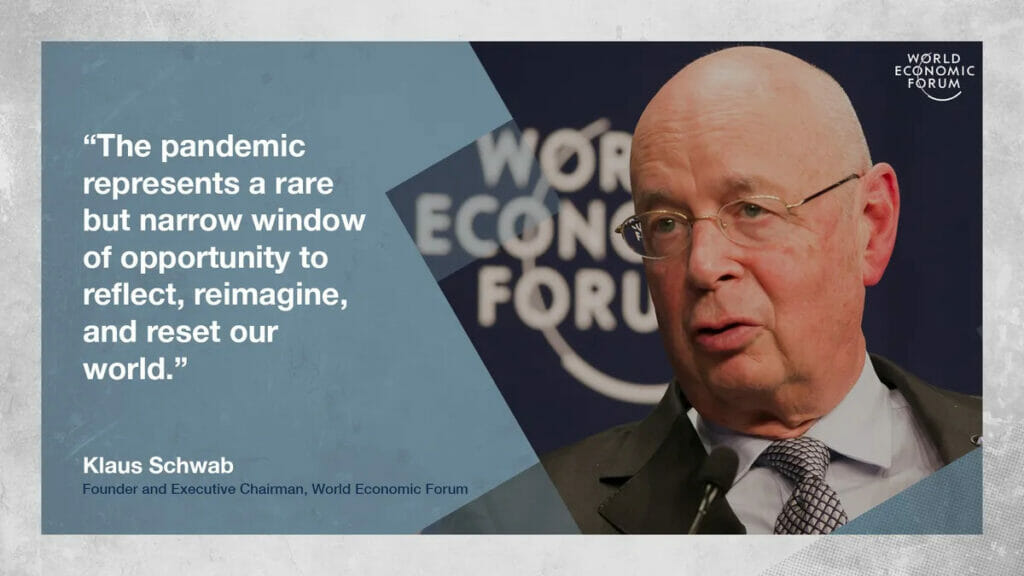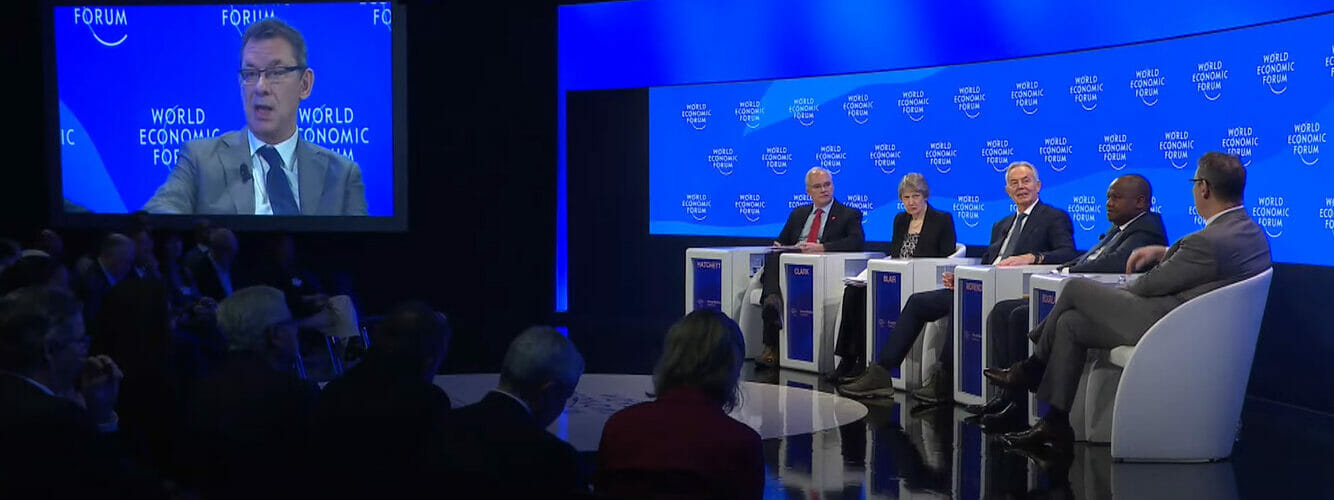The “next pandemic” seems to be a reoccurring buzzword of recent.
After all, U.S. President Joe Biden on three separate occasions in 2022 that there will be “another pandemic” and a “second pandemic,” for example.
Moreover, multibillionaire investor and philanthropist Bill Gates told Al Jazeera this past Christmas Eve the world needs to prepare for the “next pandemic,” which includes constructing mRNA factories across the world, and to “moderate some of the insanity online.”
Even former-CDC Director Robert Redfield has been very bold and dogmatic that the coming “great pandemic” will be that of bird flu, and it will have a whopping lethality of 10-50%.
Now a panel at this year’s annual World Economic Forum summit meeting in Davos, Switzerland, has embraced this eventuality, and have met to discuss what can be done in a hundred-day cycle in order to prevent the “next pandemic.”
According to the WEF’s itinerary, this session discusses:
Creating safe and effective vaccines in 100 days is estimated to give economies and societies a chance of containing the next outbreak before it spreads. What will it take to get there?
Join this session to learn how the Coalition for Epidemic Preparedness Innovations (CEPI) is accelerating the development of vaccines and enabling equitable access during outbreaks.
Richard Hatchett, Chief Executive Officer for the Coalition for Epidemic Preparedness and Innovations (CEPI) – a group that was developed 6 years ago at the WEF – moderated the discussions, who were joined by the other speakers which include:
- Tony Blair – Former-Prime Minister of the United Kingdom
- Helen E. Clark – Chair of the Lancet Countdown High-Level Advisory Board on Health and Climate Change, and former-Prime Minister of New Zealand
- Silvino Augusto José Moreno – Minister of Industry and Trade for the Ministry of Industry and Trade of Mozambique
- Shyam Bishen – Head of Shaping the Future of Health and Healthcare, and Member of Executive Committee for the World Economic Forum Geneva
- Albert Bourla – CEO of Pfizer
Hatchett began the discussion by speaking in a mellow tone, saying, “Imagine if we had had two Covid scale events within a decade – that is certainly within the realm of possibility.” As concerning the response to the Covid pandemonium, Hatchett said that response around the world was “nothing short of heroic.”
Furthermore, he revealed that CEPI and the U.S. National Academy of Medicine formed a “regional vaccine manufacturing collaborative” in a bid to create a framework for those who want to increase their vaccine manufacturing capacity. Hatchett said that they had a “closed-door meeting” later that day to further discuss this “framework.”
[…] The driver of the “100 Days Mission” [is] SEPI’s goal that we’ve articulated, which has now been embraced by the G7 and G20, to accelerate vaccine development even and over above what was achieved in 2020.To be able to deliver vaccines to new threats within 100 days. That would give us a fighting shot of preventing pandemic all together, and reducing their impact.
Hatchett explained
As noted by Hatchett and in a press release on CEPI’s website, the coalition has just announced that they have partnered with Institut Pasteur de Dakar to construct “a regional manufacturing hub for COVID-19 and other vaccines in Dakar, Sénégal. In its initial phase, IPD’s new modular facility will manufacture up to 300 million doses of COVID-19 vaccine annually for use in Africa.”
BioNTech has already signed-on to produce mRNA vaccines at this facility, but the plant “is actively exploring partnerships with other vaccine companies to produce licensed COVID-19 vaccines in its new manufacturing facility,” and plans to produce other types of mRNA vaccines when need be.
Over one year after the first COVID-19 vaccine was given, deep vaccine inequity persists. It is clear that additional, globally distributed manufacturing capacity is needed to reduce the reliance of the majority of the world on just a few countries for vaccines.
I commend our partners at IPD for their rapid progress towards this goal and look forward to supporting their work to establish a vaccine manufacturing hub for Africa.
Richard Hatchett said in a statement
The WinePress has noted in other reports that Moderna has already partnered with the U.K., Canada, and Australia to build new mRNA facilities, that can produce all sorts of mRNA shots at quicker speeds.
Moving into the actual discussion, Helen Clark was asked as to how to make sure governments continually are aware of the threat of pandemics. Clark said as concerning as Covid she said, “We’ll keep Covid in the headlines and at the forefront of leader’s attention, in a way that it might not of threes years into a pandemic, she said.”
She then said this:
I think around the world populations are over Covid but I think, as we know, Covid ain’t over us, and requires a continual level of focus.
It remains the moment to seize, to make lasting change so that the world can cope with a future outbreak with pandemic potential, far better than we were able to do on the run this time.

Tony Blair reverberated a similar sentiment, saying that the production of all sorts of new vaccines for a swath of diseases “give us the opportunity to make big changes in the health of the world.”
You tell [the politicians], ‘Actually in the next few years you’re going to have the opportunity to make a big difference to the healthcare of your population,’ that will focus them.
The second thing they need is to focus on the opportunities to change healthcare that have arisen of the result of our experiences with Covid.
I think there is a huge impetus now for a national digital infrastructure. Digitalization in healthcare I think is one of the great game changers. We should be helping countries to develop a national digital infrastructure, which they will need with these new vaccines.
Blair excitedly explained
Midway through the discussion Hatchett praised Bourla for Pfizer’s rapid development and administration of their mRNA vaccines in record time, but inquired Bourla as to how they can get it done even faster.
Bourla explained that his biggest obstacle were the politics surrounding it and how the vaccine was “heavily politicized.” But as to how the velocity in which these vaccines can be produced, Bourla revealed one of the so-called “secrets” to the success with the first vaccines:
The world was lucky that there was a thriving live sciences sector that was at the peak of its performance, that was able to strike a phenomenal collaboration during the pandemic with regulatory agencies: that’s the secret.
The secret was that there were all these companies in the world that were ready scientifically, to address the challenge, and they work hand-in-hand with regulators that were spending sleepless nights to be able to review the progress so they can authorize the next step, so that you are able to move.
If we’re able to do it [with] Covid why we can’t we repeat it with Alzheimer’s, in cancer, in Parkinson’s […] Those are the two characteristics.
So for me, the work should start from here.
Later Bourla noted that countries should not lockdown like they did but have a much more “equitable” way of distributing the doses.
Blair was asked for his take on what should be done to improve the delivery of vaccines and other treatments within this 100-day window. Blair blasted those believe and push “unforgiveable politics” that get in the way and are “unforgiveable,” which thus need to be addressed.
I think there’s sort of unforgiveable politics and forgivable politics.
The unforgiveable politics is turning a public health issue into a political issue. […] What’s unforgiveable is turning things like whether you wear a facemask or not into a political issue: that is unforgiveable and stupid.
[…] You’ve got to put the different elements of the players in this that are going to be important in not just that a future pandemic is well handled, but that healthcare systems are developed properly, and as new treatments come online they’re made available to more people. You’ve gotta get the right people in a partnership together to workout how they create the mechanism, so in the future it is better than it was in the past. […] This is issue to do with the technology and the digital infrastructure – I just want to emphasize how important I think that is. In the end, you need the data, you need to know who’s been vaccinated and who hasn’t been. So of the vaccines that will come on down the line will be multiple shots, so you got to have […] a proper digital infrastructure, and many countries don’t have that. Blair said
AUTHOR COMMENTARY
Whoso mocketh the poor reproacheth his Maker: and he that is glad at calamities shall not be unpunished.
Proverbs 17:5
These sickos and psychos will have their day, make no mistake about it. But for now, they are being used as vessels to bring God’s judgment to pass on a world that hates his word.
In case you missed the memo, another shamdemic is on the way, and they are going to work overtime to make sure people are vaxxed to the teeth this time; and not just vaccinated, but to have it all precisely monitored.
[7] Who goeth a warfare any time at his own charges? who planteth a vineyard, and eateth not of the fruit thereof? or who feedeth a flock, and eateth not of the milk of the flock? [8] Say I these things as a man? or saith not the law the same also? [9] For it is written in the law of Moses, Thou shalt not muzzle the mouth of the ox that treadeth out the corn. Doth God take care for oxen? [10] Or saith he it altogether for our sakes? For our sakes, no doubt, this is written: that he that ploweth should plow in hope; and that he that thresheth in hope should be partaker of his hope. (1 Corinthians 9:7-10).
The WinePress needs your support! If God has laid it on your heart to want to contribute, please prayerfully consider donating to this ministry. If you cannot gift a monetary donation, then please donate your fervent prayers to keep this ministry going! Thank you and may God bless you.








I’m actually translating Bryan’s video called “What is the ‘real world’?, and I think it relates to this article. People are going to fall for it because they are blinded, and they like it to be so. They can’t handle reality. They get deceived by a bunch of deceivers that are deceived themselves.
The $ickos are leaving Davos today and will be busy little beavers bringing us Another SURPRISE and MORE VACCINES! (“Mastering Our Futures!) Jesus Christ will soon Master Their Futures!
Maranatha!!!